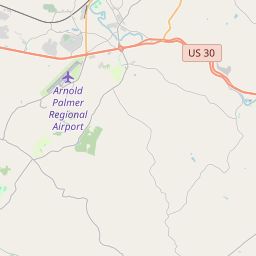Saint Clair Hollow
Historical marker location:
Ligonier, Pennsylvania
( Marker is at the intersection of Lincoln Highway (U.S. 30) and St. Clair Hollow Road, on the right when traveling east on Lincoln Highway.)
Marker installed: 1927







© OpenStreetMap contributors
Loading...
Searching for other points of interest within 3 miles of this location.The Liberty Bell, an iconic symbol of American independence, was originally cast in England in 1752 and cracked during its first use. It was recast twice in Philadelphia, and the current bell has been on display in Independence National Historical Park since 2003.
About Westmoreland County
Westmoreland County Timeline
Westmoreland County, located in southwestern Pennsylvania, has a rich and diverse history that spans several centuries. The area was originally inhabited by various Native American tribes, including the Lenape and the Shawnee, who relied on the region's abundant natural resources for their livelihoods.
The European settlement of Westmoreland County began in the mid-18th century, with the construction of Fort Duquesne by the French along the Ohio River. This act prompted the British to establish Fort Prince George in response, which served as a key military outpost during the French and Indian War. Following the end of the war, the British gained control of the territory and renamed it Westmoreland County in 1773.
The 19th century brought significant industrial and economic growth to Westmoreland County. Its location near rich deposits of coal and limestone made it an ideal location for the development of the steel industry. Companies such as Westmoreland Coal Company and Pittsburgh Plate Glass Company flourished, fueling the region's economic prosperity. The county also played a crucial role in the American Civil War, with many of its residents joining the Union Army to fight for the emancipation of slaves.
In the 20th century, Westmoreland County experienced both triumphs and challenges. The county witnessed increased urbanization and population growth, with cities like Greensburg and Latrobe becoming major hubs of commerce and industry. However, the decline of the steel industry in the late 20th century led to significant job loss and economic downturn. In recent years, efforts have been made to diversify the economy and attract new industries.
Today, Westmoreland County is a vibrant and thriving community that warmly embraces its history while looking towards the future. The county's rich heritage, natural beauty, and strong community spirit continue to attract residents and visitors alike.
The European settlement of Westmoreland County began in the mid-18th century, with the construction of Fort Duquesne by the French along the Ohio River. This act prompted the British to establish Fort Prince George in response, which served as a key military outpost during the French and Indian War. Following the end of the war, the British gained control of the territory and renamed it Westmoreland County in 1773.
The 19th century brought significant industrial and economic growth to Westmoreland County. Its location near rich deposits of coal and limestone made it an ideal location for the development of the steel industry. Companies such as Westmoreland Coal Company and Pittsburgh Plate Glass Company flourished, fueling the region's economic prosperity. The county also played a crucial role in the American Civil War, with many of its residents joining the Union Army to fight for the emancipation of slaves.
In the 20th century, Westmoreland County experienced both triumphs and challenges. The county witnessed increased urbanization and population growth, with cities like Greensburg and Latrobe becoming major hubs of commerce and industry. However, the decline of the steel industry in the late 20th century led to significant job loss and economic downturn. In recent years, efforts have been made to diversify the economy and attract new industries.
Today, Westmoreland County is a vibrant and thriving community that warmly embraces its history while looking towards the future. The county's rich heritage, natural beauty, and strong community spirit continue to attract residents and visitors alike.
Westmoreland County Timeline
This timeline provides a glimpse into the major events and milestones that have shaped the history of Westmoreland County, Pennsylvania.
- 1773: Westmoreland County is created by the Province of Pennsylvania
- 1778: Fort Ligonier is built during the American Revolutionary War
- 1782: The Gnadenhutten massacre occurs in present-day Westmoreland County
- 1793: The county seat is established in Greensburg
- 1835: The Pennsylvania Main Line Canal is completed, boosting the county's economy
- 1875: The Pittsburgh, Virginia and Charleston Railroad is completed, further stimulating economic growth
- 1905: Westmoreland County becomes the leading producer of coal in Pennsylvania
- 1927: The West Penn Hospital Association is founded in Greensburg
- 1957: The Arnold Palmer Regional Airport opens in Latrobe
- 1970: Westmoreland Community College is established
- 1992: The filming of the movie "The Silence of the Lambs" takes place in Westmoreland County